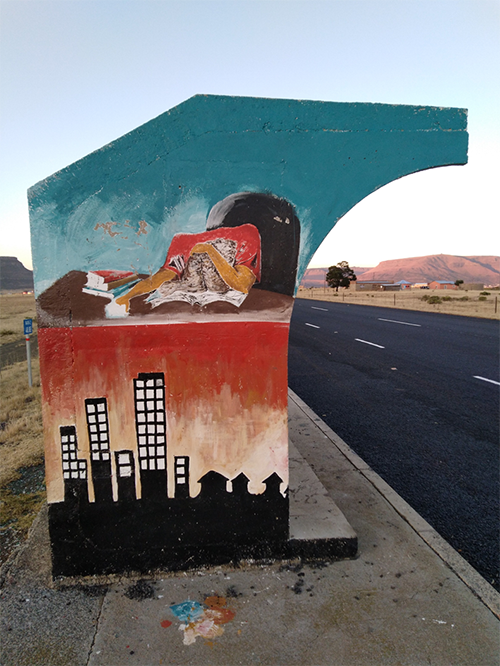College of Education
A learner is like a maize field

College of Education (CEDU) Together Making Schools Better project members visited Mnxe Primary School in Cala, Eastern Cape, on 16 and 17 July 2018. This displayed their dedication to upholding the legacy of the late Dr Nelson Mandela.
On 16 July, the day before the school reopened for the second term, the project team was at the school together with the principal and officials from the Department of Public Works. Project leader Dr Saone J Mohapi noted that this showed the commitment of stakeholders to having teaching and learning start on the first day on which the school reopened.
Professor Monica Jojo explained that Unisa had responded to public concern relating to the underperformance of South African schools in science, mathematics and languages by instituting the 500 Schools Project. The Unisa team, therefore, wished to learn more about the difficulties experienced by the teaching staff, learners, parents, and the school governing body as stakeholders responsible for improving Mnxe Primary School.
“It is also in our interest to learn of strategies that work better for the school in order to extrapolate the model used and test it in other schools such that they become better,” she said. The teachers welcomed the visit, with one stating that the intervention by Unisa had expedited the payment of his salary, as he had been in an unpaid government post for about six months.
Although the redeployment process had deprived the school of the services of three teachers, a Head of Department and a new principal had been appointed to the school. Parents welcomed the HoD and promised to support her, as they had witnessed commitment and an improvement in the operation of the school following her appointment.
As an additional form of intervention, Jojo urged parents to make use of a homework club established close to the school with the aim of equipping learners from Grade R to Grade 5 with numeracy and literacy skills using materials provided by Rhodes University. The club accommodates learners from five primary schools in the Cala district, and encourages learners to learn from one another through peer collaboration and teaching.
During the meeting with the school governing body and school management team, Professor Mpho Dichaba explored strategies for promoting and sustaining parental involvement in education. She noted that parental involvement in our schools is considered vital in the promotion of effective teaching and learning; yet, sadly, it is often missing. She therefore encouraged parents to get involved in the education of their children and, as important stakeholders or partners in education, to feel joy and pride in this.
A discussion with the school management team and school governing body of the reasons for the lack of parental involvement at Mnxe revealed that most parents are illiterate, and that some parents are not available to support their children because they work far away from their homes and have left their children in the care of grandparents who are not able to support their learning fully. In some cases learners’ parents have died, and the learners live in child-headed homes, requiring them to assume many other responsibilities in addition to their school work.
Dichaba made the observation that education is so complex that it cannot be the sole responsibility of teachers. She encouraged the parent component of the school governing body to realise that teachers rely on their support in order to continually improve the quality of teaching and learning for the betterment of both the school and its community. She concluded by comparing a learner to a maize field; teachers and parents need to work together to sustain its development through activities such as preparing the soil, planting, weeding, watering and harvesting.
Dr Geof Tshepiso, an expert in educational technology, had the following to say: “I am glad that the district in which Mnxe is, has taken its first steps in the right direction. The district provided laptops for every teacher at Mnxe who is on the Department of Basic Education’s payroll. It has been over a year since the department supplied the laptops, but teachers seemed frustrated because they did not know what to do with them. Although the department had good intentions in providing the laptops, the teachers are not trained to use them, let alone to switch them on and off. Only one teacher who is an SGB appointee was able to use this form of modern technology. The teachers were also fascinated by the fact that they could use indigenous technology and games to teach their learners, something they never thought of. There is still a lot to do in promoting technology, either modern or indigenous, to enhance teaching and learning at Mnxe.”
Elvis Nkoana, during the briefing session, emphasised the importance of education as a powerful weapon against rural poverty and encouraged all stakeholders at Mnxe Primary School to support one another to improve the school environment in a way that will benefit the black child.
The visit ended on high note when the newly elected school governing body promised the team members that they would support the school management team in attracting more learners to attend Mnxe Primary School.
Although the teachers felt demoralised and unsupported at the beginning of the meeting, they gained hope and undertook to do everything possible to raise the bar and ensure that teaching and learning continued as they should.
*By Saone Mohapi and Dineo Horner
Publish date: 2018-10-10 00:00:00.0


 Unisa units ignite enthusiasm for community engagement
Unisa units ignite enthusiasm for community engagement
 Unisa Protection Services staff graduates with BA Information Sciences degree
Unisa Protection Services staff graduates with BA Information Sciences degree
 Unisa Library partners with Swartland Municipality
Unisa Library partners with Swartland Municipality
 Leading by example: Mpumalanga RSRC deputy speaker graduates
Leading by example: Mpumalanga RSRC deputy speaker graduates
 Navigating students' academic odyssey at Unisa with the Student Retention Unit
Navigating students' academic odyssey at Unisa with the Student Retention Unit